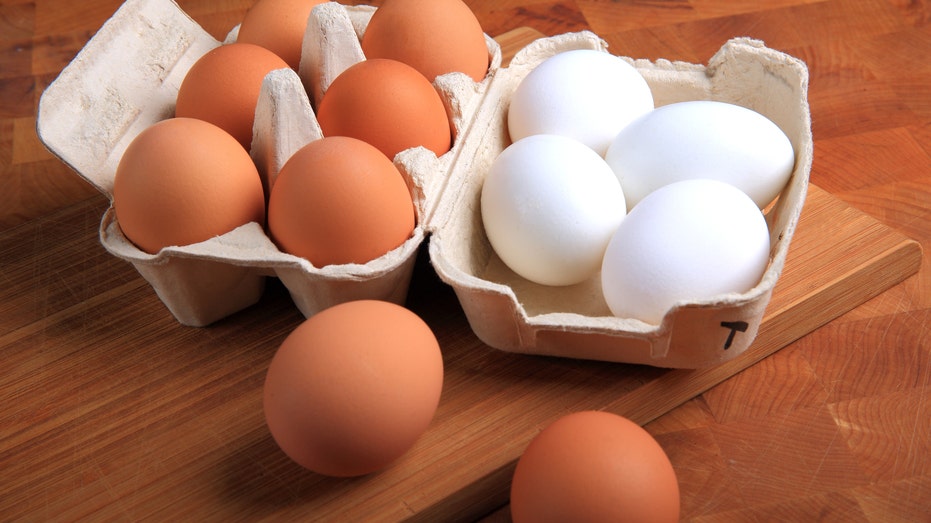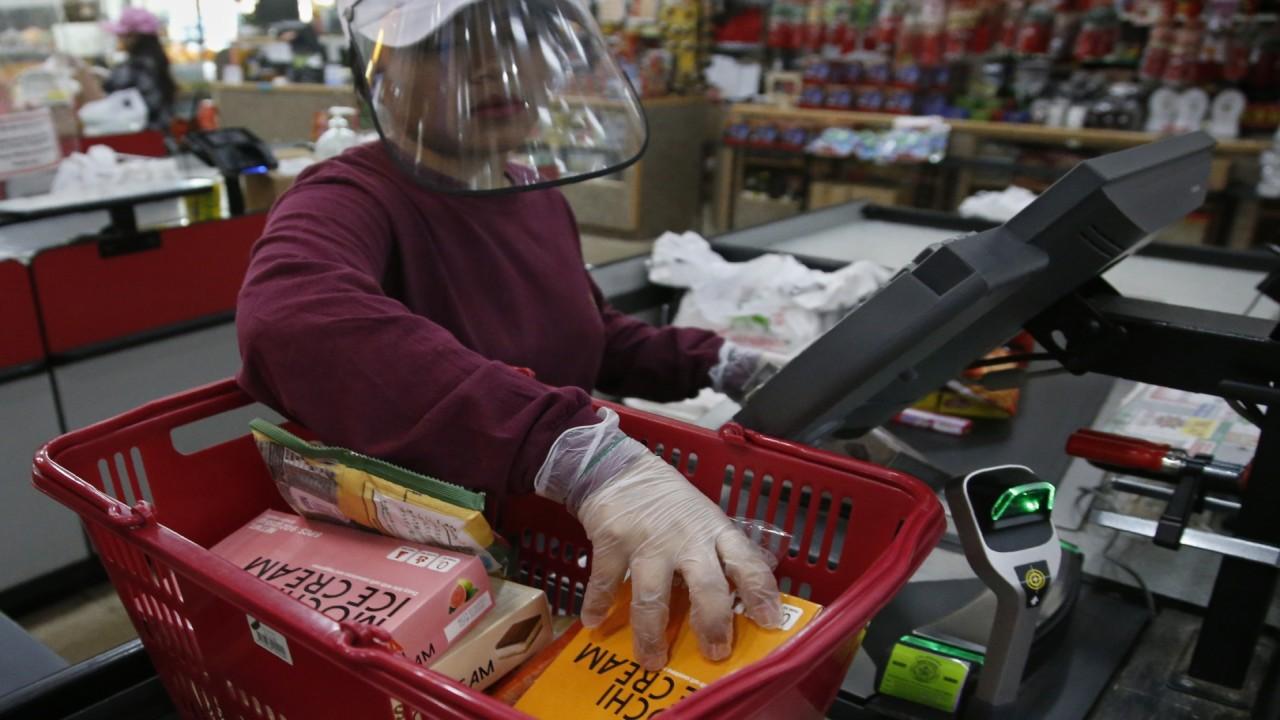For grocers, eggs are getting more expensive amid coronavirus
Egg prices across the U.S. averaged $3.01 a dozen at the end of last week
Wholesale egg prices have more than tripled as consumers' coronavirus-driven buying clears supermarket shelves, piling up costs for grocers as they struggle to keep the staple in stock and affordable.
Egg prices across the U.S. averaged $3.01 a dozen at the end of last week, compared with 94 cents at the beginning of March, according to U.S. Department of Agriculture data.
CORONAVIRUS FEARS WEIGH ON FRONT-LINE GROCERY WORKERS
That rise far outpaces cost increases for other common foods like ground beef. Wholesale costs for whole chickens, butter, cheese and ham have fallen, despite consumers rushing to stock up, partly because of plunging demand from restaurants.
Consumers' sudden, surging demand for eggs -- with some supermarkets ordering four to six times their normal volume, industry officials estimated -- comes after a money-losing year for many U.S. egg producers that prompted some to shrink their flocks.
Rising egg prices, along with rapidly changing prices for other food commodities, are compounding grocers' budgeting and planning challenges as the coronavirus pandemic forces Americans to shift from restaurant dining to eating at home. Soaring prices are frustrating some grocery-chain executives, who are scrambling to secure supplies and girding for prices to rise even higher, while trying to hold prices stable for consumers.

Fresh organic eggs (iStock)
Retailers anticipate that egg supplies will stay tight. It takes four to five months to raise a hen to egg-laying age, and few farmers so far plan to build new barns or significantly expand their flocks in response to the coronavirus-driven demand surge.
Anthony Hucker, chief executive of Southeastern Grocers, said: "Egg is by far the steepest and the fastest in terms of the speed of increase." Prices are the highest they have been since the avian influenza of 2015 and supply is likely to get tighter, said Mr. Hucker, who heads the chain of more than 700 stores that includes the Winn-Dixie and Bi-Lo chains.
The more eggs disappear from the shelves, the tighter the squeeze on grocery stores' profit margins. Over the four weeks ended March 22, sales of fresh eggs at U.S. retail stores were about 30% higher than the prior month, according to market research firm IRI. Retail prices declined about 5%.
GROCERY SHOPPING TIPS FOR AVOIDING CORONAVIRUS
Randy Edeker, president of Midwest grocery chain Hy-Vee Inc., said it is hard to ask consumers to pay more for eggs and other protein as the pandemic drives people to stock up. Eggs have long been a cheap source of protein for low-income families, food-industry officials said.
"Costs are going up right now," Mr. Edeker said. "We're just going to have to lose money on eggs."
Lincoln, Neb.-based B&R Stores Inc. is selling a dozen eggs for $2.48, though the chain is paying $2.93, up from 98 cents two weeks prior. Some products are also increasing in price, but not as much as eggs. B&R's wholesale price of ground beef increased by 25%, or $1 higher per pound, and chicken and pork prices went up by roughly 15%.
"We're all selling eggs below market price. On a staple item like eggs, there are times when you make money and times when you lose money," said Mark Griffin, president of B&R Stores.
To keep eggs in stock, the chain bought surplus inventory from food-service distributor Sysco Corp., which increasingly is selling food to supermarkets as restaurants close.
STORES OFFER CORONAVIRUS HOURS FOR SENIORS, AT-RISK SHOPPERS
Margarita Higgs, a 26-year-old stay-at-home mother, said she worries about the potential price increase because her family goes through three to four dozen eggs every week.
"It's something that's hard to replace in your diet," said Ms. Higgs, who lives in Houston with her twins, parents and brother. "We've been eating a lot of eggs."
The surge follows a tough period for U.S. egg producers, who on average lost 2.7 cents per dozen eggs produced last year, according to the Iowa-based Egg Industry Center, an industry-funded research group at Iowa State University. Cal-Maine Foods Inc., the biggest U.S. egg supplier, on March 30 reported a 10% decline in sales for the quarter ended Feb. 29, because of sinking egg prices and high supplies, with profits dropping by about two-thirds from the year earlier, to $13.7 million.
Coronavirus-driven demand could bring a windfall for Cal-Maine and other big egg suppliers. Chief Executive Dolph Baker said that in recent weeks some egg prices have jumped to record levels, and the Mississippi-based company has so far avoided supply or transport disruptions.
Feed and fuel -- two of the biggest costs in producing eggs -- are getting cheaper. Corn and soybean futures prices in March fell 7.5% and 0.8%, respectively. Gasoline prices in some parts of the country have dipped below $1 a gallon.
GET FOX BUSINESS ON THE GO BY CLICKING HERE
Farmers over the past few years have built new barns to supply supermarket and restaurant chains' requirements for cage-free eggs, but hadn't significantly reduced the number of conventional egg-laying chickens, leading to high U.S. egg supplies. That changed at the beginning of this year, as farmers since December have shrunk the total number of egg-laying chickens by 11.6 million, or 3.4%, according to USDA estimates.
R.W. Sauder, which markets 7 million hens in Lititz, Pa., cut 15% of its flock a couple months ago to get it in line with projected demand, which didn't account for a pandemic.
"We have not changed pricing. It's all driven by pure demand," President Mark Sauder said.
The coronavirus has driven up prices faster than the 2015 avian influenza outbreak, which led to the death of about 10% of domestic egg-laying hens. In mid-2015, wholesale egg prices climbed by about 126% over a period of four months after the first U.S. egg farm case was confirmed, according to USDA data.
CLICK HERE TO READ MORE ON FOX BUSINESS
Bob Krouse, CEO of Indiana-based MPS Egg Farms, said sales have surged 35% to 40% in recent weeks. But Mr. Krouse said his company, which raises about 10 million hens across four farming operations, isn't likely to reap outsize profits, because its sales prices are governed by contracts linked to grain prices and other factors.
MPS scaled back some of its flock in 2019 and has some barns sitting empty, but Mr. Krouse said he isn't yet planning on bringing in new hens. "Once we're through the coronavirus, it'll be back to business as usual," he said.




















